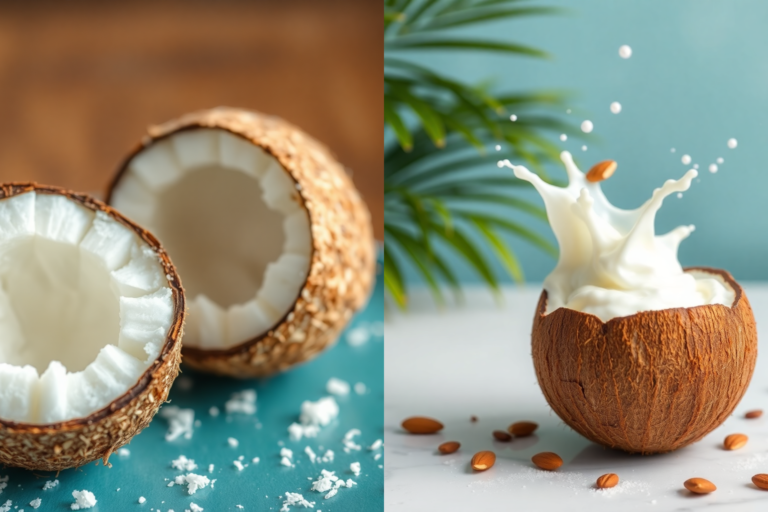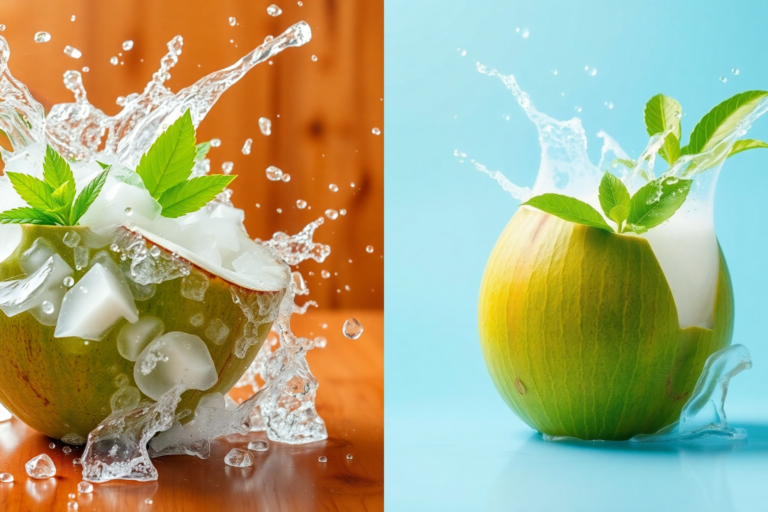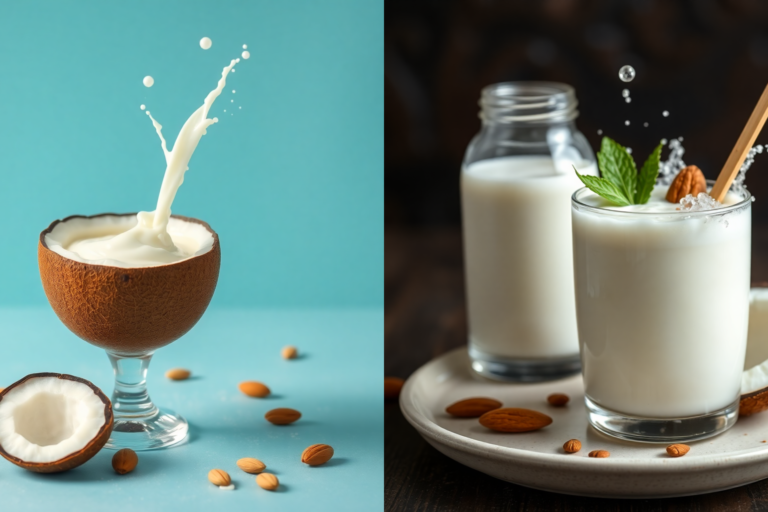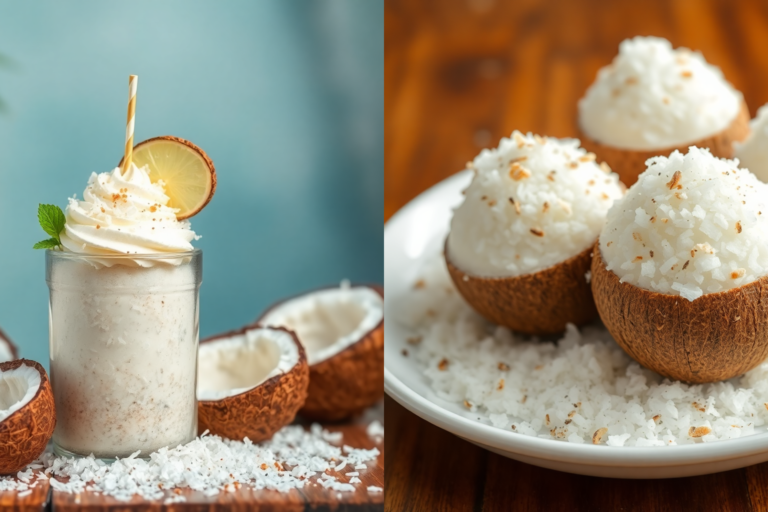Introduction to Grated Coconut
Grated coconut is a versatile ingredient that adds flavor, texture, and nutrition to a wide range of recipes. Made from the flesh of mature coconuts, grated coconut is typically dried or desiccated to preserve its freshness and extend its shelf life. It is available in both sweetened and unsweetened varieties, catering to different culinary needs. Grated coconut is used in many traditional dishes, desserts, and even beverages, providing a rich, nutty taste that enhances the overall flavor profile.
Grated Coconut: A Nutritious Addition to Your Diet
Including grated coconut in your diet offers a variety of health benefits. Rich in healthy fats, particularly medium-chain triglycerides (MCTs), grated coconut supports heart health, boosts energy, and aids in digestion. The MCTs in grated coconut are quickly absorbed by the body, providing an immediate energy source and helping with weight management. Additionally, grated coconut is a good source of dietary fiber, which promotes healthy digestion and helps to regulate blood sugar levels.
Beyond its healthy fats and fiber content, grated coconut is packed with essential minerals such as manganese, copper, and iron. Manganese, for instance, plays a vital role in bone health and metabolism. Copper supports healthy immune function, while iron aids in oxygen transport throughout the body. These nutrients make grated coconut an excellent addition to a well-rounded, nutritious diet.
Incorporating Grated Coconut into a Nutritious Diet
There are numerous ways to enjoy grated coconut as part of a balanced diet. It can be sprinkled on top of smoothies, oatmeal, or yogurt for an added crunch and flavor. Grated coconut can also be incorporated into baked goods, such as muffins, cookies, and cakes, providing texture and nutritional benefits. Whether used in savory or sweet dishes, grated coconut is a fantastic way to enhance your meals with healthy fats and minerals.
In addition to its use in food, grated coconut can also be used in various natural beauty products. The oil from grated coconut is often used in skincare routines due to its moisturizing properties, offering another health benefit beyond its nutritional value.
Rich in Dietary Fiber: Understanding the Benefits of Grated Coconut
Grated Coconut, known for its delightful texture and rich flavor, is not only a delicious addition to various dishes but also a powerhouse of nutrients. One of the standout qualities of Grated Coconut is its high dietary fiber content, which plays a crucial role in promoting digestive health. In this section, we’ll explore the fiber content in Grated Coconut and its numerous benefits for gut health and overall wellness.
Explanation of Fiber Content in Grated Coconut
Grated Coconut is packed with both soluble and insoluble fiber. A typical serving of Grated Coconut contains a significant amount of fiber that can contribute to your daily intake. The high fiber content in Grated Coconut is what makes it so beneficial for digestion. Soluble fiber, found in Grated Coconut, helps to absorb water, forming a gel-like substance that slows digestion, promoting a feeling of fullness and aiding in blood sugar regulation. Insoluble fiber, on the other hand, adds bulk to stool and helps to prevent constipation by promoting regular bowel movements.
Benefits of Fiber for Digestion and Overall Gut Health
The dietary fiber in Grated Coconut offers several benefits for digestion and gut health:
Improved Digestion: The insoluble fiber in Grated Coconut helps move food through the digestive tract, reducing the risk of constipation and promoting overall digestive health. A diet rich in fiber helps maintain a healthy gut by ensuring smooth digestion and bowel movements.
Gut Health: Fiber serves as a prebiotic, feeding the beneficial bacteria in the gut. Grated Coconut’s fiber can promote a healthy microbiome, which is essential for immune function, nutrient absorption, and even mood regulation. By nourishing good gut bacteria, fiber helps maintain a balanced digestive system.
Weight Management: Fiber is known for its ability to promote feelings of fullness, which may help reduce overall food intake. Including Grated Coconut in your meals can help curb hunger and prevent overeating, contributing to weight management and healthy metabolism.
Cholesterol Reduction: The soluble fiber in Grated Coconut can help lower levels of LDL (bad) cholesterol by binding to it and removing it from the body. This can have a positive impact on heart health, reducing the risk of heart disease.
Blood Sugar Control: The fiber in Grated Coconut slows the absorption of sugar, which can help regulate blood sugar levels. This makes Grated Coconut an excellent choice for those looking to manage their blood sugar levels, particularly individuals with diabetes.
Incorporating Grated Coconut into your diet can significantly improve your digestive health and provide essential nutrients to support a healthy gut. The fiber content in Grated Coconut is a key component that contributes to these impressive health benefits.
How to Include Grated Coconut in Your Diet
Grated Coconut can easily be added to various dishes, making it a versatile ingredient. From smoothies to baked goods, Grated Coconut is an excellent source of fiber that can enhance the texture and flavor of your meals while offering numerous health benefits. Consider adding Grated Coconut to your breakfast oats, mixing it into your salad dressings, or using it as a topping for yogurt and fruit bowls. Its fiber-rich content is a great way to boost the nutritional value of your meals.
Grated Coconut: A Source of Healthy Fats
Types of Fats Found in Grated Coconut
Grated coconut is a popular ingredient in many cuisines, offering a distinct flavor and a variety of health benefits. One of the most notable aspects of grated coconut is its fat content. Unlike many other fat sources, the fats found in grated coconut are primarily medium-chain triglycerides (MCTs), a type of healthy fat that provides several key health benefits. These MCTs are absorbed directly into the liver and converted into quick energy, making grated coconut an excellent energy booster.
Grated coconut also contains saturated fats, but it is important to note that the saturated fats in coconut are unique. They are mostly made up of MCTs, which differ from the long-chain saturated fats found in animal products. MCTs in grated coconut have been shown to increase the body’s energy expenditure and may support fat loss, making grated coconut an ideal addition to a balanced diet. Furthermore, while coconut contains saturated fats, these fats are considered heart-healthy when consumed in moderation.
The Role of Healthy Fats in Grated Coconut for Energy Provision
The healthy fats found in grated coconut play an essential role in energy provision. MCTs are quickly metabolized by the body and can be used as an immediate source of energy, making grated coconut an excellent addition to meals and snacks when a quick energy boost is needed. For athletes or those with high energy needs, the inclusion of grated coconut in their diet can help sustain energy levels throughout the day without the blood sugar spikes associated with processed carbs.
In addition to providing energy, the fats in grated coconut also support brain function. Since the MCTs in grated coconut are readily converted to ketones, they provide an alternative fuel source for the brain, potentially improving mental clarity and focus. This makes grated coconut a great option for individuals looking to boost cognitive performance while maintaining their energy levels.
Heart Health and Grated Coconut
Despite common misconceptions about saturated fats, the fats found in grated coconut can actually be beneficial for heart health when consumed in moderation. The MCTs in grated coconut have been shown to increase good cholesterol (HDL) levels, which helps to reduce the risk of cardiovascular disease. Additionally, the healthy fats in grated coconut can contribute to a balanced lipid profile, supporting overall heart health.
Grated coconut also contains lauric acid, a specific type of saturated fat that has been associated with antimicrobial properties and a potential reduction in the risk of heart disease. By including grated coconut in your diet, you can take advantage of these heart-healthy fats, contributing to better cardiovascular health.
Abundant in Essential Minerals: Grated Coconut’s Nutritional Powerhouse
Key Minerals in Grated Coconut
Grated coconut is not only a flavorful ingredient for cooking and baking, but it also offers an impressive range of essential minerals that are vital for maintaining optimal health. Among the minerals found in grated coconut, key players include iron, manganese, and copper. These minerals are integral to various bodily functions, ensuring everything from healthy blood circulation to robust bone health and energy production.
Iron: A Vital Mineral in Grated Coconut
Iron plays an essential role in the body’s production of hemoglobin, the protein responsible for carrying oxygen through the blood. Grated coconut is a great source of iron, which is crucial for maintaining energy levels, preventing fatigue, and supporting overall bodily functions. Consuming grated coconut, especially in baked goods or savory dishes, can help boost your iron intake, supporting healthy blood circulation.
Manganese: Promoting Bone and Skin Health with Grated Coconut
Another important mineral found in grated coconut is manganese. This mineral is a powerful antioxidant, which helps combat oxidative stress and inflammation. Additionally, manganese is essential for the formation of connective tissues, bone health, and the metabolism of carbohydrates. Grated coconut can provide a good amount of manganese, enhancing your skin’s appearance by promoting collagen production, and supporting overall bone density.
Copper: Supporting Heart and Immune Health with Grated Coconut
Grated coconut also contains copper, an essential trace mineral that plays a key role in energy production and the formation of red blood cells. Copper helps in maintaining a healthy heart, immune system, and nerve function. It works synergistically with other minerals like iron to support the body’s overall health. By incorporating grated coconut into your diet, whether in coconut-based desserts, curries, or smoothies, you’ll be contributing to your body’s copper intake.
The Role of Essential Minerals in Maintaining Bodily Functions
Minerals like iron, manganese, and copper are indispensable for several bodily functions, and grated coconut is an excellent natural source. These minerals work together to support a variety of essential processes in the body, from enhancing cognitive function to maintaining healthy metabolism. Grated coconut’s unique mineral content makes it an excellent addition to any balanced diet, whether used in sweet treats or savory dishes.
How Grated Coconut Supports Bodily Functions
Grated coconut helps maintain optimal bodily functions by providing a steady supply of key minerals that aid in muscle and nerve function, energy production, and immune support. Including grated coconut in your diet can be an easy and delicious way to meet your daily mineral needs. Whether sprinkled over a tropical smoothie, mixed into granola, or used in baked goods like coconut muffins and cakes, grated coconut is a versatile and nutrient-packed ingredient.
Supports Immune Health with Grated Coconut
Grated Coconut: A Natural Immunity Booster
Grated coconut is not only a delicious ingredient used in a variety of recipes but also a powerful ally in supporting immune health. Its remarkable benefits come from the presence of essential nutrients, including lauric acid, which contributes to its antimicrobial properties. Consuming grated coconut regularly can help fortify your immune system, providing protection against infections and diseases.
The Role of Lauric Acid in Grated Coconut
One of the most notable components in grated coconut is lauric acid, a medium-chain fatty acid with potent antimicrobial and antiviral properties. When you consume grated coconut, lauric acid works by strengthening the body’s defenses, enabling it to fight off harmful pathogens like bacteria, viruses, and fungi. This makes grated coconut an excellent addition to your daily diet to support and maintain a robust immune system.
How Lauric Acid in Grated Coconut Enhances Immune Function
Lauric acid found in grated coconut is converted in the body into monolaurin, a compound known for its antiviral, antifungal, and antibacterial properties. Studies suggest that grated coconut can help improve the body’s ability to combat infections, particularly by preventing the growth of harmful bacteria and viruses. By incorporating grated coconut into your diet, you can strengthen your immune system naturally, supporting its ability to respond effectively to health threats.
Grated Coconut and Its Antimicrobial Properties
In addition to lauric acid, grated coconut is packed with other beneficial compounds that enhance its antimicrobial capabilities. The fats present in grated coconut, combined with its fiber and antioxidant content, make it a powerful immune-boosting food. Grated coconut helps improve gut health by promoting the growth of good bacteria, which plays a critical role in immune function. A healthy gut is essential for maintaining a strong immune system, and grated coconut contributes to its well-being.
How Grated Coconut Contributes to a Stronger Immune System
Regular consumption of grated coconut supports overall immune health by aiding digestion, boosting the production of white blood cells, and providing a rich source of antioxidants. By adding grated coconut to your meals, you help provide your body with essential nutrients to fight off illnesses and strengthen your immune response. Whether you add it to smoothies, baked goods, or savory dishes, grated coconut enhances your nutrition while supporting immune health.
Promotes Healthy Skin and Hair with Grated Coconut
Grated coconut is not just a delicious addition to your culinary creations but also an excellent natural product that can promote healthy skin and hair. The nutrients found in grated coconut have long been recognized for their benefits in beauty routines, making it a popular ingredient in various skincare and haircare treatments. In this article, we will explore the nutrients that benefit skin and hair health and how grated coconut can be used effectively in beauty routines.
Nutrients in Grated Coconut for Skin and Hair Health
Grated coconut is packed with essential vitamins, minerals, and fatty acids that support healthy skin and hair. Some of the key nutrients include:
Healthy Fats: The medium-chain triglycerides (MCTs) in grated coconut are great for moisturizing the skin and hair. These fats help retain moisture in the skin, leaving it soft and hydrated, while also preventing dry and brittle hair.
Antioxidants: Grated coconut contains antioxidants like vitamin E and polyphenols, which help protect the skin from oxidative stress caused by free radicals. This can slow down the aging process and maintain a youthful appearance.
Proteins and Minerals: Proteins in grated coconut, along with minerals like potassium, magnesium, and zinc, contribute to stronger, healthier hair. These nutrients help promote hair growth, reduce breakage, and improve overall hair texture.
Lauric Acid: A prominent fatty acid found in grated coconut, lauric acid, has antimicrobial properties that protect the skin from harmful bacteria and fungi. This helps keep the skin clear, preventing acne and other skin irritations.
Usage of Grated Coconut in Beauty Routines
Grated Coconut for Skin Care
Grated coconut can be incorporated into your skincare routine in several ways:
Moisturizing Coconut Scrub: By mixing grated coconut with a natural oil like coconut oil or honey, you can create an exfoliating scrub that gently removes dead skin cells while hydrating the skin. This scrub will leave your skin feeling soft, smooth, and glowing.
Coconut Face Mask: A simple mask made with grated coconut, yogurt, and a bit of turmeric can help brighten the complexion. The nourishing properties of grated coconut, combined with the anti-inflammatory benefits of turmeric, make it perfect for calming irritated or inflamed skin.
Hydrating Coconut Lotion: Grated coconut can be infused in oils like olive or almond oil to create a nourishing lotion that provides deep hydration. This lotion can be applied to dry skin to restore its moisture and softness.
Grated Coconut for Hair Care
Grated coconut is equally beneficial for your hair, and there are many ways to use it:
Coconut Hair Mask: Combine grated coconut with coconut oil and apply it as a deep-conditioning treatment. This mask helps nourish the scalp, promotes hair growth, and reduces dandruff. The rich fatty acids in grated coconut work to moisturize and strengthen hair strands, making them shiny and smooth.
Grated Coconut Scalp Massage: Massaging grated coconut into the scalp stimulates circulation, which encourages hair growth. It also helps to reduce hair loss and promote healthy, thick hair by providing essential nutrients directly to the hair follicles.
Coconut Hair Rinse: For a natural hair rinse, mix grated coconut with water and strain the liquid. Use this rinse after shampooing to restore moisture and add shine to your hair. It works wonders for dry or frizzy hair, providing smoothness without weighing it down.











